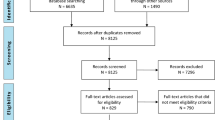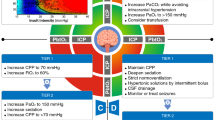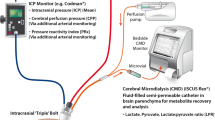Abstract
Background
Age is an important factor in determining prognosis following severe head injury (SHI), although mortality in patients ≥65 years is poorly reported. The aim of this study was to document mortality in patients with SHI ≥65 years.
Methods
A retrospective analysis of prospectively collected data from the TARN (Trauma Audit and Research Network) database (1996–2004) was performed. Six hundred and sixty-nine patients aged ≥65 with a GCS <9 after a head injury were identified, and mortality at 3 months was recorded.
Findings
Mortality was 71% in 65- to 70-year-old patients (n = 137) (CI, 64–79), 75% for patients aged 70–75 years (n = 147) (CI, 68–82), 85% in patients aged 75–80 years (n = 160) (79–91), and 87% for patients >80 years (n = 225) (CI, 83–91). Mortality for all patients ≥65 years with a GCS 3–5 was >80%. A better outcome was observed in patients with a GCS = 6–8 [65–70 years, 47% (CI, 30–64); 70–75 years, 56% (CI, 43–69); 75–80 years, 73% (CI, 62–85); >80 years, 79% (CI, 70–87)].
Conclusions
SHI-related mortality continues to increase with age. Overall, these data support a conservative approach to the severely head-injured elderly patient; however, patients presenting with a GCS = 6–8 and below the age of 75 may represent a group where more aggressive therapy may be indicated.
Similar content being viewed by others
References
American Association of Neurological Surgeons (2000) Part II: Early indicators of prognosis in severe traumatic brain injury. Management and prognosis of severe traumatic brain injury, pp 171–286
Adekoya N, Thurman DJ, White DD, Webb KW (2002) Surveillance for traumatic brain injury deaths—United States, 1989–1998. MMWR Surveill Summ 51:1–14
Baker SP, O’Neill B (1976) The injury severity score: an update. J Trauma 16:882–885
Champion HR, Sacco WJ, Copes WS, Gann DS, Gennarelli TA, Flanagan ME (1989) A revision of the Trauma Score. J Trauma 29:623–629
Committee on Injury Scaling and Association for the Advancement of Automotive Medicine (1990) The abbreviated injury scale 1990 revision. Des Plaines, Illinois
Gan BK, Lim JH, Ng IH (2004) Outcome of moderate and severe traumatic brain injury amongst the elderly in Singapore. Ann Acad Med Singapore 33:63–67
Hukkelhoven CW, Steyerberg EW, Rampen AJ, Farace E, Habbema JD, Marshall LF, Murray GD, Maas AI (2003) Patient age and outcome following severe traumatic brain injury: an analysis of 5600 patients. J Neurosurg 99:666–673
Jamjoom A, Nelson R, Stranjalis G, Wood S, Chissell H, Kane N, Cummins B (1992) Outcome following surgical evacuation of traumatic intracranial haematomas in the elderly. Br J Neurosurg 6:27–32
Johnson CL, Margulies DR, Kearney TJ, Hiatt JR, Shabot MM (1994) Trauma in the elderly: an analysis of outcomes based on age. Am Surg 60:899–902
Kilaru S, Garb J, Emhoff T, Fiallo V, Simon B, Swiencicki T, Lee KF (1996) Long-term functional status and mortality of elderly patients with severe closed head injuries. J Trauma 41:957–963
Maurice-Williams RS (1999) Head injuries in the elderly. Br J Neurosurg 13:5–8
Munro PT, Smith RD, Parke TRJ (2002) Effect of patients age on management of acute intracranial haematoma: a prospective national study. BMJ 325:1001
Patel HC, Menon DK, Tebbs S, Hawker R, Hutchinson PJ, Kirkpatrick PJ (2002) Specialist neurocritical care and outcome from head injury. Intensive Care Med 28:547–553
Pennings JL, Bachulis BL, Simons CT, Slazinski T (1993) Survival after severe brain injury in the aged. Arch Surg 128:787–793
Susman M, DiRusso SM, Sullivan T, Risucci D, Nealon P, Cuff S, Haider A, Benzil D (2002) Traumatic brain injury in the elderly: increased mortality and worse functional outcome at discharge despite lower injury severity. J Trauma 53:219–223
Ushewokunze S, Nannapaneni R, Gregson BA, Stobbart L, Chambers IR, Mendelow AD (2004) Elderly patients with severe head injury in coma from the outset–has anything changed? Br J Neurosurg 18:604–607
Acknowledgements
We would like to thank the following participating hospitals in this study: Addenbrooke's Hospital, Wexham Park Hospital Slough, Frenchay Hospital, Airedale General Hospital Yorkshire, Royal Albert Edward Infirmary Wigan, Glan Clwyd District General Hospital, Torbay Hospital Devon, Arrowe Park Hospital Merseyside, Trafford General Hospital Manchester, Royal Bolton Hospital, Grantham & District Hospital, University Hospital Lewisham, Great Western Hospital Swindon, Hope Hospital Salford, Barnsley District General Hospital, Huddersfield Royal Infirmary, Royal Devon & Exeter Hospital, University Hospital North Staffordshire, Guys Hospital, Basildon Hospital Essex, Poole Hospital, Hull Royal Infirmary, University Hospital of North Tees, Prince Philip Hospital, Bassetlaw Hospital, Ipswich Hospital, Royal Hallamshire Hospital Sheffield, Princess Alexandra Hospital, University Hospital of Wales Cardiff, James Cook University Hospital, Royal Hampshire County Hospital, University Hospital, Aintree, Queen Alexandra Hospital, Birmingham Heartlands Hospital, James Paget Hospital, Royal Lancaster Infirmary, Queen Elizabeth Hospital Gateshead, Walton Centre for Neurology Liverpool, Jersey General Hospital, Blackpool Victoria Hospital, Royal Liverpool University Hospital, Warrington Hospital, John Radcliffe Hospital Oxon, Royal London Hospital, Bradford Royal Infirmary, Kent & Canterbury Hospital, Kent & Sussex Hospital, Watford General Hospital, Kettering General Hospital, Royal Preston Hospital, West Cumberland Hospital, Kings College Hospital London, Burnley General Hospital, Kings Mill Hospital Nottinghamshire, West Wales General Hospital, Calderdale Royal Hospital, Leeds General Infirmary, Royal Sussex County Hospital, Leicester Royal Infirmary, Royal United Hospital Bath, Weymouth & District Hospital, Royal Victoria Hospital Belfast, Leighton Hospital Cheshire, Whiston Hospital, City Hospital Birmingham, Lincoln County Hospital, Colchester General Hospital, Scarborough Hospital, Conquest Hospital East Sussex, Manchester Royal Infirmary, Scunthorpe General Hospital, Withybush General Hospital Dyfed, Countess of Chester Hospital, University Hospital Birmingham, Worcester Royal Infirmary, Hereford County Hospital, Worthing Hospital, Morriston Hospital, Wrexham Maelor Hospital, Nevill Hall Hospital, South Tyneside District Hospital, Wycombe Hospital, Newcastle General Hospital, Southampton General Hospital, Wythenshawe Hospital, Norfolk & Norwich General Hospital, York District Hospital, North Manchester General Hospital, Ysbyty Gwynedd District General, North Tyneside General Hospital, Derbyshire Royal Infirmary, Northampton General Hospital, Derriford Hospital, Northern General Hospital Sheffield, St George's Hospital London, Dewsbury District Hospital, St Helier Hospital, Nottingham University Hospital, St James' University Hospital Leeds, Peterborough District Hospital, Pilgrim Hospital, Pinderfields General Hospital, Stepping Hill Hospital, Eastbourne District General Hospital, Pontefract General Infirmary, Stoke Mandeville Hospital, Epsom Hospital, Queen Elizabeth Hospital Kings Lynn, Sunderland Royal Hospital, Fairfield General Hospital, Queen Elizabeth, Queen Mother Hospital Kent, and Tameside General Hospital, Rochdale Infirmary.
Author information
Authors and Affiliations
Corresponding author
Additional information
Comments
This is yet another informative and extremely well written manuscript from the Trauma Audit and Research Network. The management of severe head injury in the elderly is particularly challenging and difficult decisions have to be made. Historically it has been perceived that elderly patients presenting with severe head injury have a very poor prognosis. This paper identifies a subgroup aged below 75 with GCS 6-8 where more aggressive therapy may be indicated. This population data provides useful guidance but management decisions still need to be made on a per patient basis taking into many demographic, clinical and social factors.
Peter Hutchinson
Cambridge, UK
Financial disclosure
Omar Bouamra and Maralyn Woodford are employed by the University of Manchester as a result of TARN funding.
Rights and permissions
About this article
Cite this article
Patel, H.C., Bouamra, O., Woodford, M. et al. Clinical article: mortality associated with severe head injury in the elderly. Acta Neurochir 152, 1353–1357 (2010). https://doi.org/10.1007/s00701-010-0666-x
Received:
Accepted:
Published:
Issue Date:
DOI: https://doi.org/10.1007/s00701-010-0666-x




